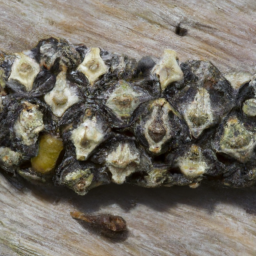Dijital Kartvizit Web Sites
Gelişmiş Bir Çok Özelliği İle Dijital Kartvizit Web Sitenizi Bu Gün Kuralım!
*256 Bit SSL Sertifikası * Full Mobil Uyumlu * Full SEO Uyumlu
İsterseniz Mobil Uygulama Seçeneğiyle

Adı : juniper scale
Bilimsel Adı : Carulaspis juniperi (Bouch
Carulaspis juniperi (C. juniperi) is a type of scale insect that belongs to the family Diaspididae. It is commonly referred to as Juniper scale and is known to infest plants belonging to the genus Juniperus. The species is found in Northern America, Europe and Asia, where it poses a threat to the health and growth of juniper plants.
The adult female of C. juniperi is oval-shaped, with a hard, brown or greyish shell that measures up to 1.5 mm in length. Males, on the other hand, are winged and have a smaller shell with a whitish appearance. Both male and female scales attach themselves to the plant's needles or stems, where they feed on the plant's sap and lay their eggs.
The presence of Juniper scales can cause considerable damage to the plant, especially in cases of severe infestation. The scales cause stunted growth, yellowing, and wilting of the plant's needles and leaves. Additionally, scales extract nutrients from the plant, which results in a lack of vigour and vitality, making the plant more susceptible to other pests and diseases.
The life cycle of C. juniperi begins when an adult female lays eggs beneath her shell. The eggs hatch into crawler larvae, which then disperse and crawl along the plant in search of a spot to settle and feed. The newly settled scales then grow and develop through various immature stages before reaching adulthood.
Several control measures can be taken to manage Juniper scale infestations. Horticultural oils and insecticidal soaps can be applied to the plant to suffocate the insects and limit their reproduction. Insecticides can also be used to kill the pests, but care should be taken to use the right product and dosage as certain insecticides may have negative impacts on non-target species.
In conclusion, Carulaspis juniperi is a harmful pest that infests juniper plants by feeding on their sap and causing considerable damage. Proper identification, monitoring and control measures should be taken to ensure that infestations are managed before they become too damaging.

Adı : juniper scale
Bilimsel Adı : Carulaspis juniperi (Bouch
Carulaspis juniperi (C. juniperi) is a type of scale insect that belongs to the family Diaspididae. It is commonly referred to as Juniper scale and is known to infest plants belonging to the genus Juniperus. The species is found in Northern America, Europe and Asia, where it poses a threat to the health and growth of juniper plants.
The adult female of C. juniperi is oval-shaped, with a hard, brown or greyish shell that measures up to 1.5 mm in length. Males, on the other hand, are winged and have a smaller shell with a whitish appearance. Both male and female scales attach themselves to the plant's needles or stems, where they feed on the plant's sap and lay their eggs.
The presence of Juniper scales can cause considerable damage to the plant, especially in cases of severe infestation. The scales cause stunted growth, yellowing, and wilting of the plant's needles and leaves. Additionally, scales extract nutrients from the plant, which results in a lack of vigour and vitality, making the plant more susceptible to other pests and diseases.
The life cycle of C. juniperi begins when an adult female lays eggs beneath her shell. The eggs hatch into crawler larvae, which then disperse and crawl along the plant in search of a spot to settle and feed. The newly settled scales then grow and develop through various immature stages before reaching adulthood.
Several control measures can be taken to manage Juniper scale infestations. Horticultural oils and insecticidal soaps can be applied to the plant to suffocate the insects and limit their reproduction. Insecticides can also be used to kill the pests, but care should be taken to use the right product and dosage as certain insecticides may have negative impacts on non-target species.
In conclusion, Carulaspis juniperi is a harmful pest that infests juniper plants by feeding on their sap and causing considerable damage. Proper identification, monitoring and control measures should be taken to ensure that infestations are managed before they become too damaging.
Firma Web Siteniz Var mı?
Mükemmel Bir Firma Web Siteniz Olsun, Bugün Kullanmaya Başlayın
*256 Bit SSL Sertifikası * Full Mobil Uyumlu * Full SEO Uyumlu
İsterseniz Mobil Uygulama Seçeneğiyle
